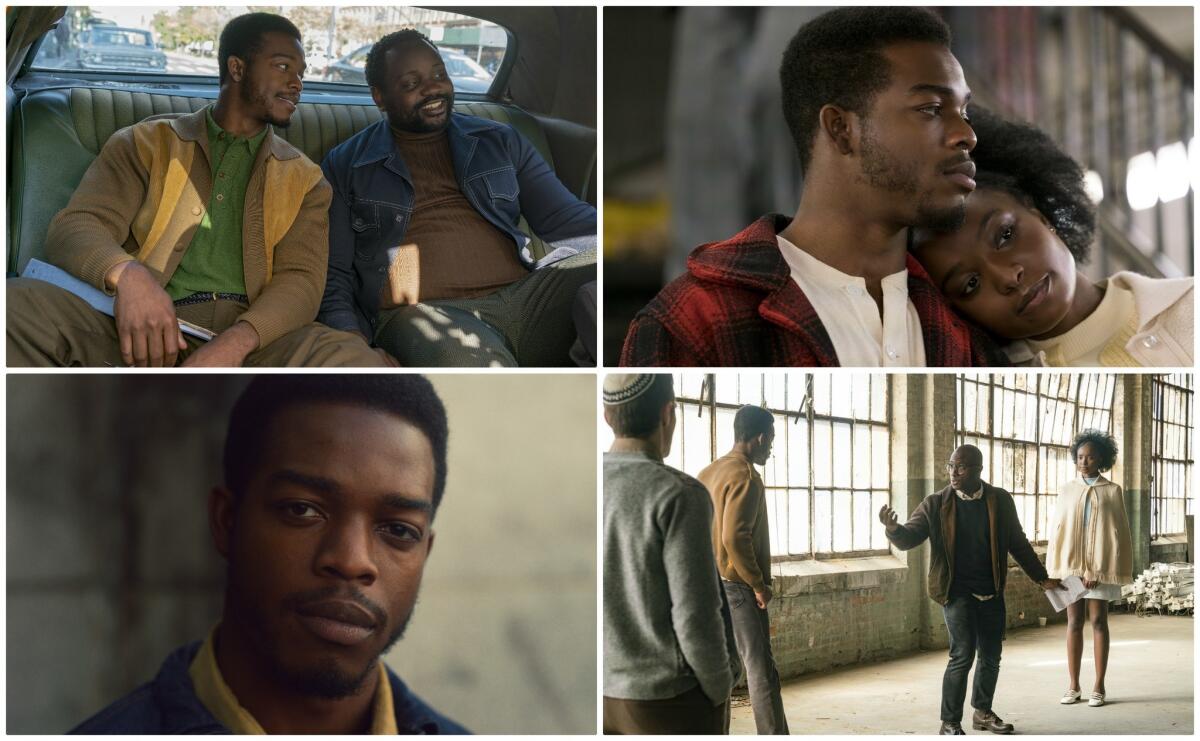Stephan James seizes a rare opportunity in ‘Beale Street’ role
![“I believed that I was Fonny,” Stephan James says, referring to the lead character in "If Beale Street Could Talk," a kindhearted young artist falsely accused of rape. “I don’t know whether [Barry Jenkins] believed it at first. There was a little bit of convincing ... to do.”](https://ca-times.brightspotcdn.com/dims4/default/9a1d381/2147483647/strip/true/crop/2048x1312+0+0/resize/1200x769!/quality/75/?url=https%3A%2F%2Fcalifornia-times-brightspot.s3.amazonaws.com%2F02%2F10%2Fe78cf68f0dd6f89c19597e735d1c%2Fla-1543524617-9xkrf1kr3j-snap-image)
- Share via
The 24-year-old Jamaican Canadian actor Stephan James is quiet, deferential and an attentive listener. It’s enough to make one wonder how he became one of the industry’s most sought after young talents. This season, he’s the male lead in two eagerly anticipated projects, Oscar-winning director Barry Jenkins’ “If Beale Street Could Talk” and Sam Esmail’s “Mr. Robot” follow-up, “Homecoming.”
“I’ve always had a very reserved personality,” James says, sipping water in the Library room of the Fairmont Miramar Hotel in Santa Monica. “So I didn’t really know how this would work for me.”
Let’s just say his demeanor belies his hustle. As soon as he saw the micro-budget 2008 romance “Medicine for Melancholy,” he knew he wanted to work with Jenkins. When he heard that the director was adapting James Baldwin’s “Beale Street” novel, he sent him a few scenes of himself on tape, and even offered to film an audition tape of every scene in the script. “I believed that I was Fonny,” he says, referring to the film’s lead character, a kindhearted young artist falsely accused of rape. “I don’t know whether [Jenkins] believed it at first. There was a little bit of convincing that I had to do.”
I always ask myself: ‘Why should we tell this story? Why does it matter to make a movie like this?'
— Stephan James on telling stories

There aren’t many roles for young black men that encourage such a level of vulnerability. James recognized that “Beale Street” was a rare opportunity. “It takes the mask off, and it allows you to see the humanity behind all these guys, and the stories behind the statistics of false imprisonment and mass incarceration; [the film] is able to give these guys real life and real soul.”
Jenkins’ film is also an unusually tender portrayal of black love. “James Baldwin is a beautiful descriptor of love, and the same is true with Barry Jenkins. Everything in [‘Beale Street’] was very specific. There was a very specific way that Barry wanted to show this kind of love, from the way I looked at [costar] KiKi Layne to the way I undressed her.”
That Layne was making her big-screen debut as Tish, Fonny’s lover and childhood best friend, didn’t pose a particular challenge, James says. “She was so open, so giving. You gotta be a special kind of performer to lead this piece.”

The bigger challenge, he says, was maintaining Tish and Fonny’s connection in a movie in which his character spends 75% of his scenes acting behind glass, filmed in extreme close-up. “It’s tough, man,” he says. “I’m not gonna lie to you. A lot of those scenes behind glass, those Interrotron shots where we’re looking directly into the camera. I don’t have KiKi sitting across from me. She’s somewhere down the hall doing her thing, and I’m staring at a reflection of her… In a way, it added to our situation, because it’s being so close to somebody but not able to touch them or feel them at all. She was just sort of this [hologram]. She was literally a reflection, and I was staring into this lens.”
To prepare for the role of a wrongly incarcerated young man, James researched the story of Kalief Browder, a young man who, after being accused in 2010 of stealing a backpack, spent three years on Rikers Island without being convicted of a crime. Two years after his release, Browder took his own life. “When I look to tell stories,” James says, “I always ask myself: ‘Why should we tell this story? Why does it matter to make a movie like this?’ And Kalief Browder is why it matters.”

In his most high-profile previous roles, James played two real-life figures who fought to combat racial injustice: Jesse Owens in “Race,” and John Lewis in “Selma.” Did he feel like he was giving himself an education on historical/social injustice through these roles? “100%,” he says. “You learn about things that truly blow your mind. I've always had an interesting perspective on American history coming from Canada, a perspective that I'm proud of, honestly. I'm sort of the outsider looking in. But whether you look at a John Lewis or a Jesse Owens, these men are directly why I'm here and why I'm able to do what I'm doing today.”
For his other major role this fall, in Amazon’s mystery drama “Homecoming,” he went from starring alongside a first-time performer in Layne to going face-to-face with America’s Sweetheart, Julia Roberts. “I knew at 7 a.m. every morning that I was going to be coming to work and sitting across from one of the most important actresses of all time,” he says. “And for me, it was just about making sure I was ready. I knew she was doing her homework. So [I did] a lot of homework.”

Sign up for The Envelope
Get exclusive awards season news, in-depth interviews and columnist Glenn Whipp’s must-read analysis straight to your inbox.
You may occasionally receive promotional content from the Los Angeles Times.




